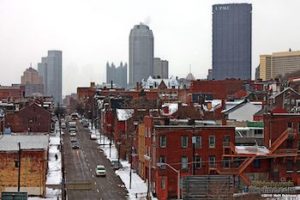
*This date in 1758 celebrates the “Hill District,” a historically African American neighborhood of Pittsburgh, PA.
Locally, following the rebellion by slaves and gaining independence of Haiti in 1804, the free Black community of the Hill District was called "Little Haiti." The early residents of the Hill District were middle-class.
Beginning in the 1910s, the Hill attracted migrants from elsewhere in the United States (mainly from the rural American South in the Great Migration) and abroad. The neighborhood's black population grew rapidly from around 10,000 in 1890 to over 37,000 by 1920. The influx of so many new residents resulted in a housing shortage exacerbated by the rigid system of segregation that limited potential housing for Blacks almost entirely to the Hill District. The experience of young, single Black men underscored the severity of the housing crisis. Under housing segregation and their marital status, these men were crammed into the limited number of units available in the district. The result was cramped boarding houses where workers slept in shifts.
Beginning in the years leading up to World War I, "the Hill" was the cultural center of Black life in the city and a major center of jazz. Black entrepreneurs established and ran a large roster of nightspots, including nightclubs, bars, and gambling dens, which required a constant influx of musical acts to keep guests entertained. The thriving musical culture, widespread in the Hill for nearly four decades, led the neighborhood to be considered "the Crossroads of the World" by poet Claude McKay. That phrase would be popularized by radio DJ Mary Dee (Mary Dee Dudley) of WHOD Radio, Pittsburgh's only Black radio station. Also, the Negro League’s Pittsburgh Crawfords baseball team significantly represented the community.
The concentration of entertainment spots along Wylie Avenue, Fullerton Street, and Center Avenue provided ready venues for both famous national acts and upstart local artists to perform. Artists like Louis Armstrong and Duke Ellington made the Hill District a regular stop on national tours. The benefits of networking often showed themselves through mentorship opportunities, as famous musicians could provide young artists with crucial career and technical advice. This was the case with renowned Pittsburgh-reared jazz pianist Mary Lou Williams, whose distinct left-hand-dominated playing style could be traced back to her youthful interactions with touring vaudeville artist Jack Howard as he played shows in the city; Williams would later note that he gave her professional advice that "would have taken me years and years to learn."
The nationally syndicated Black-run newspaper "The Pittsburgh Courier " also advertised the Pittsburgh-reared community's presence and development. Despite its cultural and economic vibrancy, in the mid-1950s, a substantial area was slated for redevelopment, displacing about 8,000 individuals. Playwright August Wilson wrote memorable stage productions about the Hill District and the community he grew up in. Ten of his plays comprise a deliberate body of work unto itself: “The Pittsburgh Cycle,” also known as the “Century Cycle.”
In 2004, the Pittsburgh City Council commemorated the 200th anniversary of Haiti's independence. In the Hill District of Pittsburgh, Pennsylvania, as of 2010, the area comprises Census Tracts 305 (Crawford Roberts, "Lower Hill"), 501 (Crawford-Roberts, "Middle Hill), 506 (Upper Hill), 509 (Bedford Dwellings), 510, and 511 (Terrace Village). The Downtown borders it on the west, the Strip District next to the Allegheny River and Polish Hill to the north, the Bluff (Uptown) on the southwest, and Oakland on the east and southeast.
The census tracts/neighborhoods noted in the Hill District are represented on the Pittsburgh City Council by the council members for District 6 (Downtown neighborhoods). Part of the Upper Hill is also represented under District 7. The 15219 ZIP code covers all five neighborhoods, and the 15213 ZIP code covers part of Terrace Village and Upper Hill.